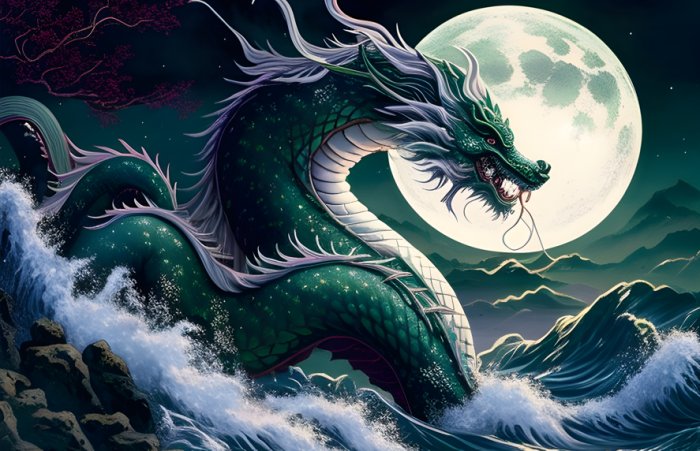A. Sutherland – AncientPages.com – One of the prominent and often invoked dragon-kings in Japanese mythology is Ryujin (Ryūjin). As the deity of the sea, he embodies the voracious nature of the ocean, symbolized by his gigantic mouth.
Image credit: Adobe Stock – Menemen
In Japanese mythology of people representing an ancient island nation, Ryujin is revered as the sea god, king of dragons, and lord of snakes and other aquatic creatures. This deity’s origin can be traced back to the Kojiki, an early Japanese chronicle of myths, legends, hymns, oral traditions, and semi-historical accounts down to 641 AD.
Also in another, more detailed work, known as Nihon Shoki, (compiled in 720 AD), Ryujin was initially referred to as Watatsumi no kami. It was not until the Edo era (1603 and 1868) that the name Ryujin became widely used to address this powerful entity.
In Japanese beliefs, the sea and ocean hold special places as a source of life, food, and destructive force. Ryujin is considered a positive, benevolent water god and a patron of Japan, credited with the challenge of a hurricane that sank the Mongolian flotilla sent by Kublai Khan.
Undoubtedly, this legendary event showcases Ryujin’s formidable power over the seas. His power is enormous because he governs the tides’ ebb and flow. His presence symbolizes both the perils and abundance of the ocean and he has complete power over all creatures in the seas and oceans.
Another of his characteristics is that he can change into a human and possess the knowledge of medicine. Occasionally, when he is in a good mood, he assumes a human form and ventures into the realm of mortals. During these visitations, he bestows his attention upon beautiful women deemed the most exquisite among the earth’s inhabitants.
Yet, in essence, Ryujin is a dragon having at his disposal unlimited powers over the storm, the rain, the thunder and the wind.
 Tawara Toda (Hidesato )aiming his shoot at the giant centipede. Tsukioka Yoshitoshi – Ukiyo-e.org (Tokyo Metropolitan Library) – Public Domain
Tawara Toda (Hidesato )aiming his shoot at the giant centipede. Tsukioka Yoshitoshi – Ukiyo-e.org (Tokyo Metropolitan Library) – Public Domain
Like dragon kings of China, Ryujin also lived under the waves, in the deepest part of the sea near the Ryukyu Islands. His home is a fabulous palace built of red and white corals, equipped with a magnificent gate and sloping roofs. From this dwelling, he controls the tides with the help of his magical jewels, as he owns countless treasures. No one in the world is richer than him.
The kingdom of Ryujin is an enchanted place, where – as myths and legends say – a single day represents a vast expanse of time, equivalent to one hundred human years. The palace is flanked by two distinct halls, each symbolizing the cyclical nature of seasons. One hall represents the changing seasons in the natural world. The other hall signifies the various stages of mortal life, from birth to death. This metaphorical representation symbolizes the profound passage of time.
The deity’s Palace of the Spring – with cherry trees adorned with a myriad of butterflies – is located in the eastern realm of Ryujin’s kingdom. In the southern expanse, there is the Palace of Summer covered with beautiful green growth full of most amazing insects.
The Palace of Fall is a captivating sight, with trees adorned in stunning shades of red and gold. In contrast, the Palace of Winter, located in the northern region, is a hall where frost and snow reign eternally.
However, it is important to note that once one enters the Palace of Winter, there is no possibility of returning from this realm.
Ryujin is the central character of several Japanese myths reflecting the unpredictable and dangerous nature of the sea. This great sea divinity can be a sinister force or a kind ruler who helps heroes in trouble.
For instance, he helped the heroic figure Hoori in his endeavors against his sibling Hoderi under the guise of a dragon and water deity, Watatsumi (presumably an alternative name for Ryujin himself). Hoori was the grandfather of Emperor Jimmu, the first Japanese Emperor and a direct descendant of the sun goddess, Amaterasu.
In another story, Ryujin stole a jewel that belonged to Kamatari, the founder of the Fujiwara clan. The jewel was returned only after Tamatori, Kamatari’s wife, dived to the Dragon King’s palace to recover the pearl, while she was threatened by all sea creatures.
According to one legend, Ryujin gave a bell to Fujiwara no Hidesato (with nickname: Tawara Toda), a Japanese folk hero, and samurai. Tawara Toda, who saved his palace from a monstrous centipede, whose body was so huge that it could cover a mountain. The warrior Tawara Toda was skilled archer known for his daring exploits and heroic deeds, but he could not immediately kill the giant creature.
Eventually, he found a way to do it successfully when he dipped his fourth and final arrow in his own saliva. Ryujin rewarded the hero with a huge, inexhaustible bag of rice that refilled itself.
Another gift was a magic cauldron where food could be cooked without fire. The bell, on the other hand, returned to the Mii-dera temple at the foot of Mount Hiei, the rightful place where it belonged.
The veneration of the dragon god Ryujin is one of the most prominent and widely celebrated festivals in Japanese culture. This annual event takes place in the month of June and holds particular significance for the agricultural community. The farmers pay homage to Ryujin, especially during periods of drought. The tradition is very old and widespread among numerous Pacific cultures.
Written by – A. Sutherland – AncientPages.com Senior Staff Writer
Copyright © AncientPages.com All rights reserved. This material may not be published, broadcast, rewritten or redistributed in whole or part without the express written permission of AncientPages.com
Expand for references
References:
Ashkenazi M., Handbook of Japanese Mythology
Hedlund T., The Japanese Mythology Bible
Russo L.,Uncovering World Mythology
Clayton, Matt. Japanese Mythology






